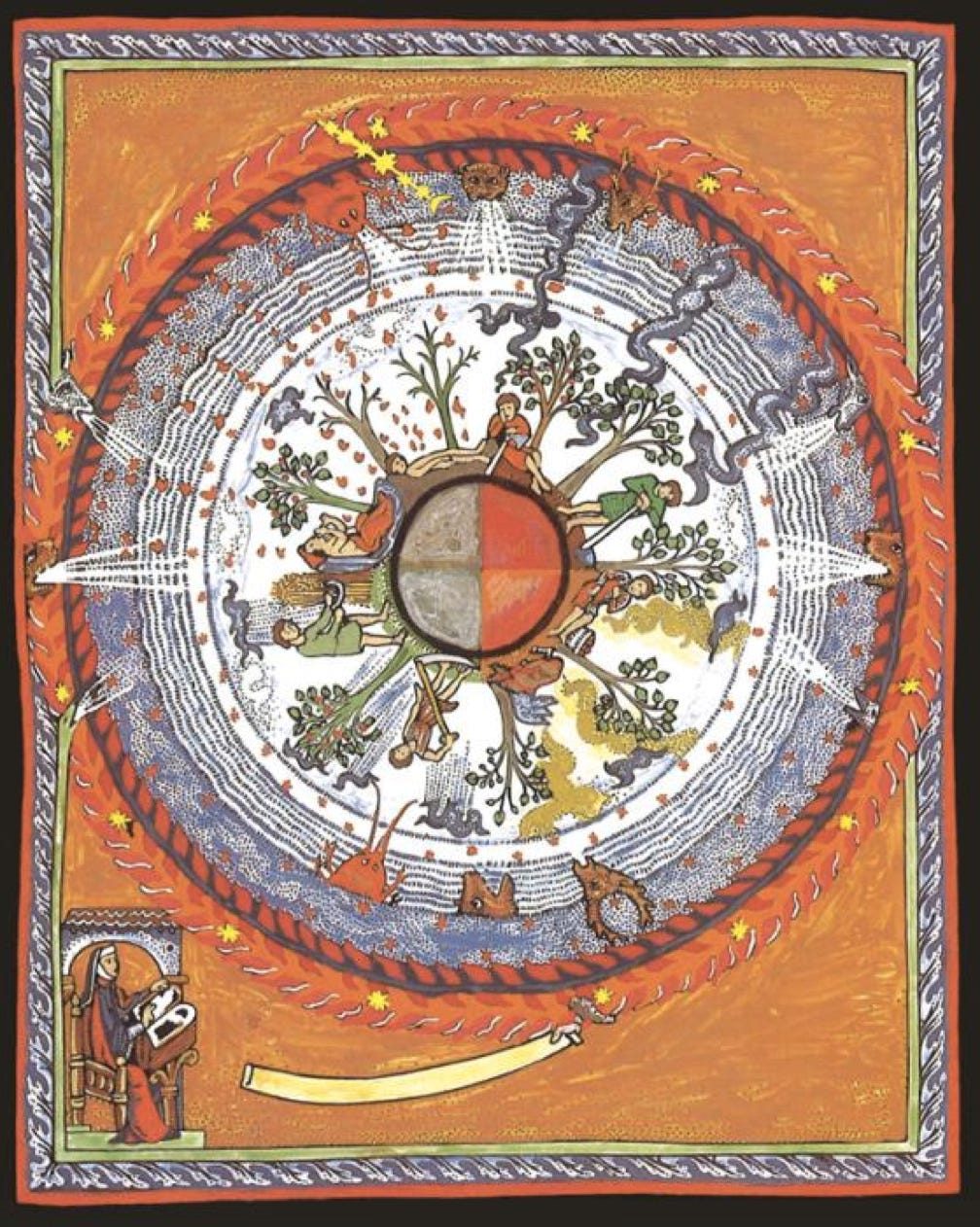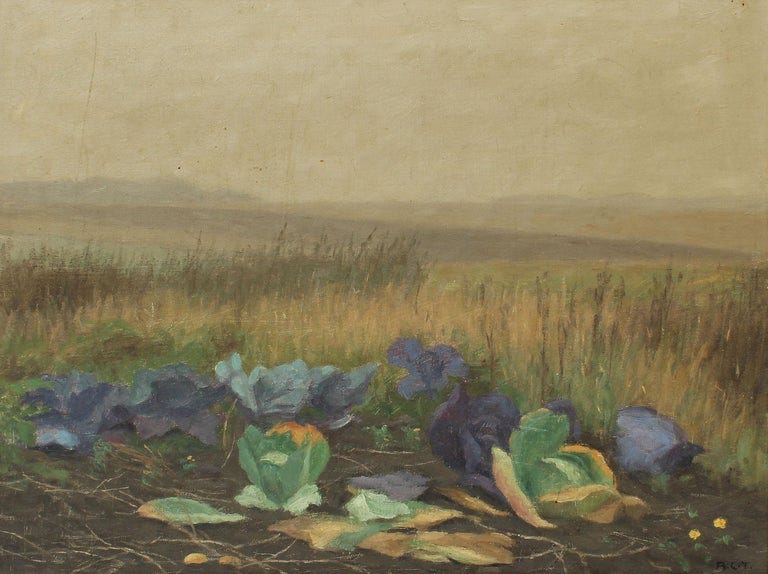#Seed041: Where Cabbage Dies and Spirit Grows
Lessons on collapse, renewal and tending to endings
I am always dazzled by the changes in the landscape whenever I tend my garden. The birds sing melodiously to newly blossomed flowers while bees buzz as berries begin to ripen. Yet amidst all this beauty, I’m often overwhelmed by the chaos of the living and the dying—vulnerable seedlings overwhelmed by a crowd of unwanted guests. Tiny creatures chomping on succulent cabbage leaves. Landscapes and ecosystems are places of beginnings and ends. They are cycles of dynamic dualism, not unlike our own lives. Unfortunately, our desire of command and conquer gets in the way—turning gratitude and patience into anger and frustration.
When I was first introduced to the tradition of Islam, I was struck by the dynamic dualism of the spiritual path. We perceive life’s journey as a path towards something greater—whether it be wealth, security, harvests, impact, or wisdom. Our seeking, be it material or spiritual, is perceived to be a straight progressive line. Yet that perception often breaks us, especially if we struggle to find meaning in ends and failures. The dynamic dualism, like the sea’s ebb and flow, reminds us that life’s journey is not a straight road, or rather may not be a road at all.

In his lexicon of Sufi terminology, the Moroccan scholar and saint Ahmad ibn ‘Ajiba compiled 143 terms related to the beginning, middle, and end of the spiritual journey. Among these terms, we find five sets that highlight the dynamic dualism as mentioned above: Contraction and expansion (qabd wa bast), separation and unification (farq wa jam’), erasure and affirmation (mahw wa ithbāt), covering and illumination (sitr wa tajālli), change and stability (talwīn wa tamkīn), and finally, nearness and distance (qurb wa bu’d). Regarding contraction and expansion, Ibn ‘Ajiba explains that this is the inner manifestation of fear and hope. He writes, “the difference between contraction and fear, on one hand, and expansion and hope on the other is that fear is connected to an external cause—losing what is loved, or being afflicted by adversity—while contraction may arise in the heart with or without a cause. Hope likewise, can be the expectation of something we love in the future, whereas expansion is a state given us freely in the present moment.”1 The saint is alluding to the inner and outer cycles of life’s journey—the gains and losses, the births and deaths, the days and nights, the sowing and harvests, and the springs and autumns. The path is not a matter of avoiding the cycle but rather responding to them in ways befitting of spiritual ascent. Ibn ‘Ajiba continues, “Vicissitudes of changing states do not alter them [the gnostics/the people of stability (sāhib al-tamkīn)], nor do upheavals and calamities.”2 Like mountains firmly planted, the seekers of God are unfazed by the outer and inner cycles. In other words, they are unfazed by beginnings and ends.
This firmness is not to be confused with an indifference towards oneself and others. It is rather an intentional withdrawal from the influences of the cycle. It is recognizing that the cycles will come and go, and something greater remains. It is about asking ourselves, what shall I do with this lot in life? As Shaykh ‘Abd al-Qadir al-Jilani reminds us, “Step out of your own self and keep distance from it. Practice detachment from your possessiveness, and surrender everything to God. Become His doorman at the door of your heart, obeying His command by admitting those He instructs you to turn away, so that you do not let passion back into your heart once it has been evicted.”3
In The Metacrisis Epoch, I wrote about predictable progression. I argued that since all complex systems collapse, we must reflect on how those systems recover from crisis. I wrote that “the question isn’t whether or not we can prevent a system from collapsing but rather how do we ensure that systems can reemerge.” Upon further reflection, I’m slowly learning that even identifying the crisis and trying to help systems reemerge is a distraction. As I reflect on my farm, I see that certain elements of the system collapses such as the aforementioned bug-ridden cabbage. Each time a part of my garden fails, I find myself not only asking what action to take, but also what attitude or understanding the moment is calling for.
As a gardener and community organizer, this is something that has been quite the struggle. We celebrate harvests but seldom know how to deal with ends. We aren’t taught how to grieve. Recently, I came across this beautiful project which supports people and communities to engage with endings. Tending to Endings is a deck of cards that can be used by community facilitators to understand that “death is not only necessary, but generative.” I’d like to think that this work completes the cycle, allowing us to withdraw from it and grow spiritually.

The question is not simply what I need to do at this moment, but what relationship and mindset am I being invited to? Of course, I still want my garden to thrive. Systems matter. But the way I relate to my garden—how I respond to its cycles of growth and decay—depends on my inner state. Tending to both is necessary, but the foundation is spiritual. If we ‘step out’ of our own selves, we become witnesses to these cycles. We become capable of stewardship, not just management, and able to care for the well-being of our fellow creatures.
Ahmad ibn ‘Ajiba. The Book of Ascension to the Essential Truths of Sufism. Translated by Mohamed Fouad Aresmouk and Michael Fitzgerald. Louisville, KY: Fons Vitae, 2011. p.32
ibid. p.58
Abd al-Qadir al-Jilani. Revelations of the Unseen (Futuh al-Ghaib). Translated by Muhtar Holland. Louisville, KY: Al-Baz Publishing, 1992. p.19



